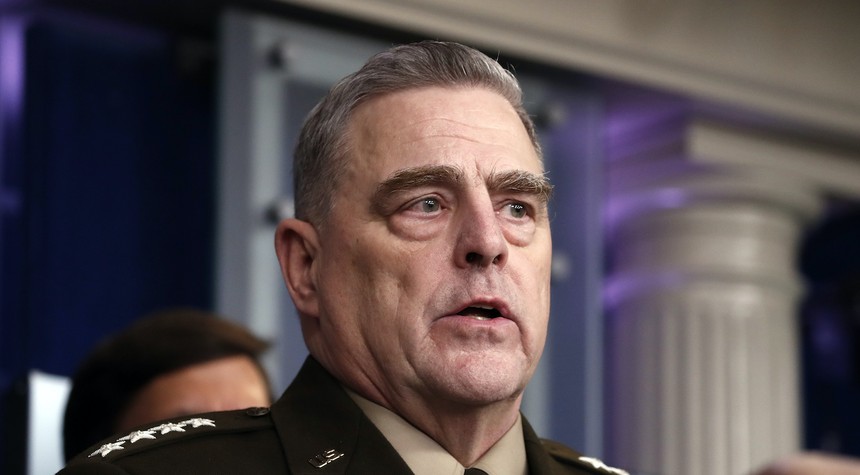Millions of Americans Could Have Died if Joint Chiefs’ Milley Warned the Chinese of an Attack

BY MARK TAPSCOTT
republished below in full unedited for informational, educational & research purposes:
Gen. Mark Milley, the chairman of the Joint Chiefs of Staff, is defending his two calls to his Chinese counterpart, Gen. Li Zuocheng of the People’s Liberation Army (PLA), during the final tense days of President Donald Trump’s tenure in the White House.
Liberals are hailing Milley for making the calls despite the fact that he had zero constitutional authority to do so if, as reported by Washington Post writers Bob Woodward and Robert Costa in their forthcoming book, he promised to give the Chinese advance notice of a U.S. attack.
Yes, read that last part again. The president’s top military adviser promised the military head of America’s most dangerous adversary that he would warn them in advance should Trump decide to launch an attack on China.
Milley is defending making the two calls as “routine” and intended to provide “reassurance” to the Chinese government during the period immediately prior to the November 2020 election, which Trump officially lost, and the January 20 inauguration of Joe Biden as his successor.
“We are not going to attack or conduct any kinetic operations against you,” Milley told the Chinese general, according to Woodward and Costa. “If we’re going to attack, I’m going to call you ahead of time. It’s not going to be a surprise.”
Trump did not know about the calls. Acting Secretary of Defense Christopher Miller claims he was not informed of the calls. Milley insisted Friday that, although the calls were routine, he would only comment in detail when he testifies before Congress in October. “I think it’s best that I reserve my comments on the record until I do that in front of the lawmakers who have the lawful responsibility to oversee the U.S. military,” he said. “I’ll go into any level of detail Congress wants to go into in a couple of weeks.”
“Lawful responsibility” coming from Milley? That’s rich.
The last time a top U.S. general defied his commander in chief was Gen. Douglas MacArthur in 1950 and 1951 during the Korean War, who publicly criticized President Harry Truman’s orders that the American military not attack north of the Yalu River, the border between North Korea and China.
Truman fired MacArthur after multiple occasions in which the general made his disagreements with his boss public. His firing was the occasion for MacArthur’s subsequent memorable farewell address to Congress in which he declared that “old soldiers never die, they just fade away.”
But Milley doesn’t appear to be in danger of being fired because Joe Biden isn’t Harry Truman. In fact, at a minimum, he should resign and a persuasive case can be made that he should face severe legal consequences.
As chairman of the Joint Chiefs, Milley has no operational authority over U.S. military operations. His role is strictly advisory and the president is free to follow or reject that advice. Taking it upon himself to warn an adversary that a U.S. attack is coming is only a short step back from going Benedict Arnold.
The president alone is the commander-in-chief and all of his subordinates, including the Joint Chiefs, have a choice – either execute orders or resign. That said, think about what could have happened had Milley somehow concluded that Trump was about to launch military action of some kind against China.
Was Trump contemplating an attack on China, as Milley feared he might? Here’s what Trump said of that allegation: “For the record, I never even thought of attacking China — and China knows that.”
Woodward and Costa claim in their book that when Milley sought to reassure him that no U.S. attack was imminent, Li said he would “take you at your word.” There is no guarantee, of course, that Li would respond in that manner if Milley was actually delivering the promised warning.
Milley doesn’t say it, at least as recounted by Woodward and Costa, but the logic of the justification for warning of an imminent attack could also have led Milley to warn the Chinese if, instead of an actual Trump attack order, the general saw evidence that persuaded him such an order was imminent.
In either case, Li would have instantly alerted his boss, President Xi Jinping, who might well assume in either scenario that Milley was being truthful and thus conclude that the prudent response is to order a counter-attack.
American intelligence doesn’t know with certainty how many nuclear missiles China presently has that are capable of hitting the continental U.S., but it surely is enough to kill tens of millions of Americans, even after our rudimentary missile defense system knocks down some number of the incoming nukes.
And remember, it was a Chinese general some years ago who confidently told a U.S. counterpart that he and his colleagues in Beijing are confident America would never trade Los Angeles for Taiwan.
If you think the Cuban Missile Crisis in 1962 or the Arab-Israeli War in 1973 were the closest this country has ever come to a nuclear conflict, those situations fade by comparison with the risk Milley took upon himself and the nuclear jeopardy to which he potentially exposed every American in doing so.
